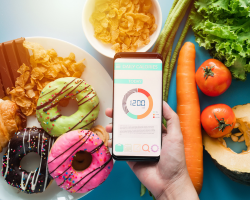Are you caught in the downward spiral of counting calories? Do you feel restricted in your food choices, have an unhealthy relationship with food or are you constantly battling hunger and fatigue?
Many diets are based on counting calories, emphasising a calorie deficit for weight loss. This is a fact! However, for lasting weight loss there’s more than just calorie counting!
In my programs, my clients don’t calorie count and they’ve loved this food freedom it’s given them.
These are the 10 reasons why I don’t use calorie counting.
1. Not all calories are the the same. For example, 200 calories from ice cream affect the body differently than 200 calories from a fruit salad. The ice cream causes a sugar spike as has more sugar and little fibre.
2. Quality of the food. It’s essential to consider the source of the calories. For example, fat calories from chips can be harmful if eaten regularly, while those from healthy fats, like avocados, can be beneficial.
3. Focus is only on weight loss. Calorie counting could encourage quick fixes, someone might chose a zero-calorie soda over a nutrient-packed smoothie just because of the calorie count, overlooking long-term health impacts.
4. Body metabolism variations. Everyone has a unique metabolic rate. Two people consuming the same number of calories can process and use them differently. And calorie intake differs due to differences in age, activity level, gender, and more. Calories burned estimates can be misleading as exercise machines and apps often provide estimates that may not be accurate for every individual.
5. Unhealthy relationship with food. It’s may lead to an unhealthy obsession with food and create anxiety around eating, leading to guilt. This is because food gets categorised as ‘good’ or ‘bad’ based just on their calorie content.
6. Causes low energy levels. This is because you are basing what to eat on calorie count rather than if you are feeling satisfied. This can have a knock on effect on energy, sleep and moods.
7. Not listening to your body cues for hunger. You stop eating when you’ve hit your calorie count, so it might leave you hungry shortly after eating.
8. Inaccuracies when counting calories. Food labels are not always accurate on calories and portion sizes can be hard to estimate.
9. Miss essential nutrients. Lacks focus on whole foods and there is the potential for nutrient deficiency. You need a balanced diet that includes all food groups.
10. Not sustainable. For many, logging every calorie after eating becomes tedious over time and hard to sustain in the long run. May lead to feeling restricted and deprived.
Whilst counting calories is important, it’s essential to recognise its limitations. A holistic approach to nutrition, by also focusing on food quality, listening to one’s body, and considering individual needs, often is more effective and sustainable.
Learn what to eat rather than depending on just your calorie count. If you have any questions do send me an email.
